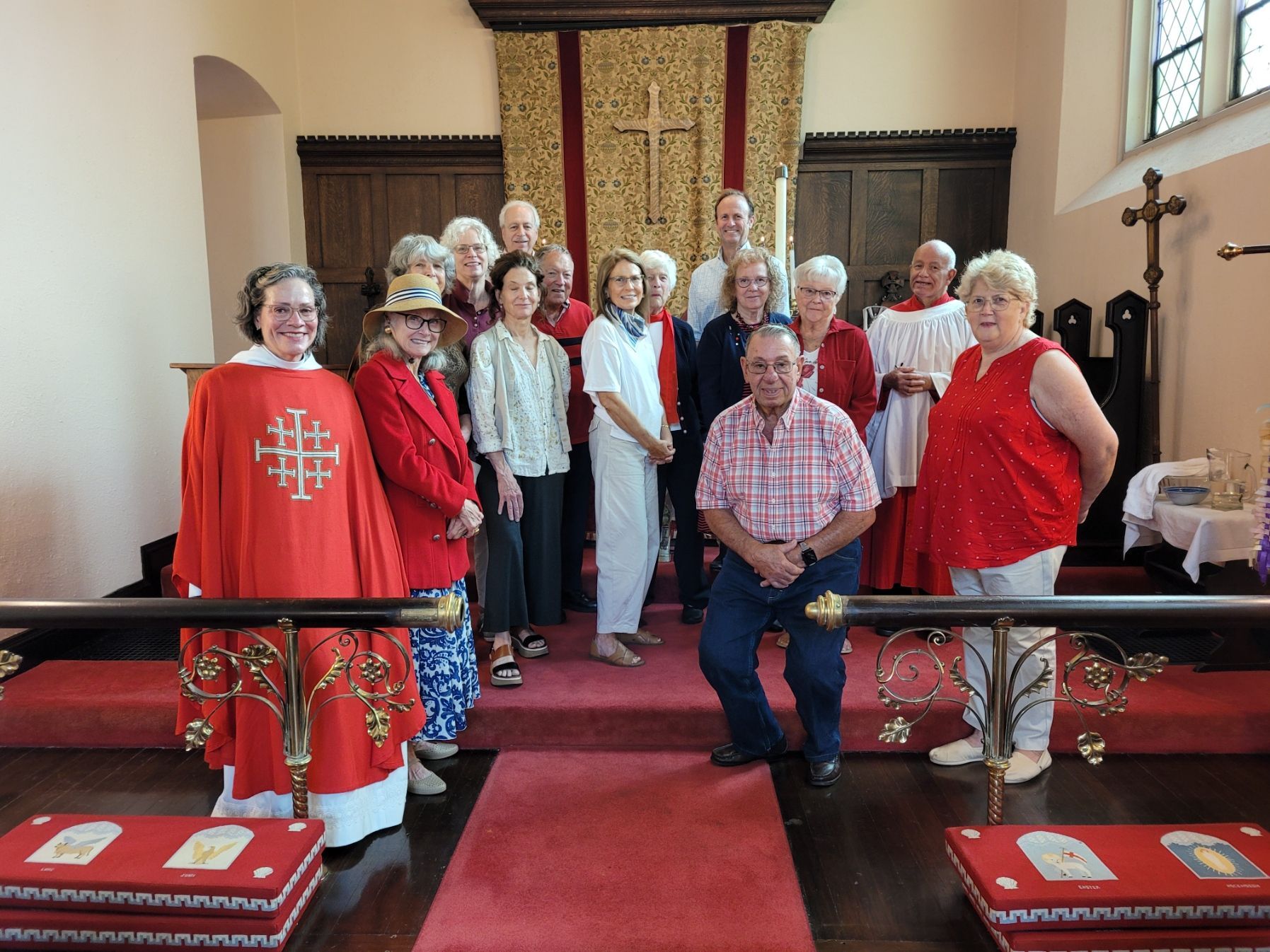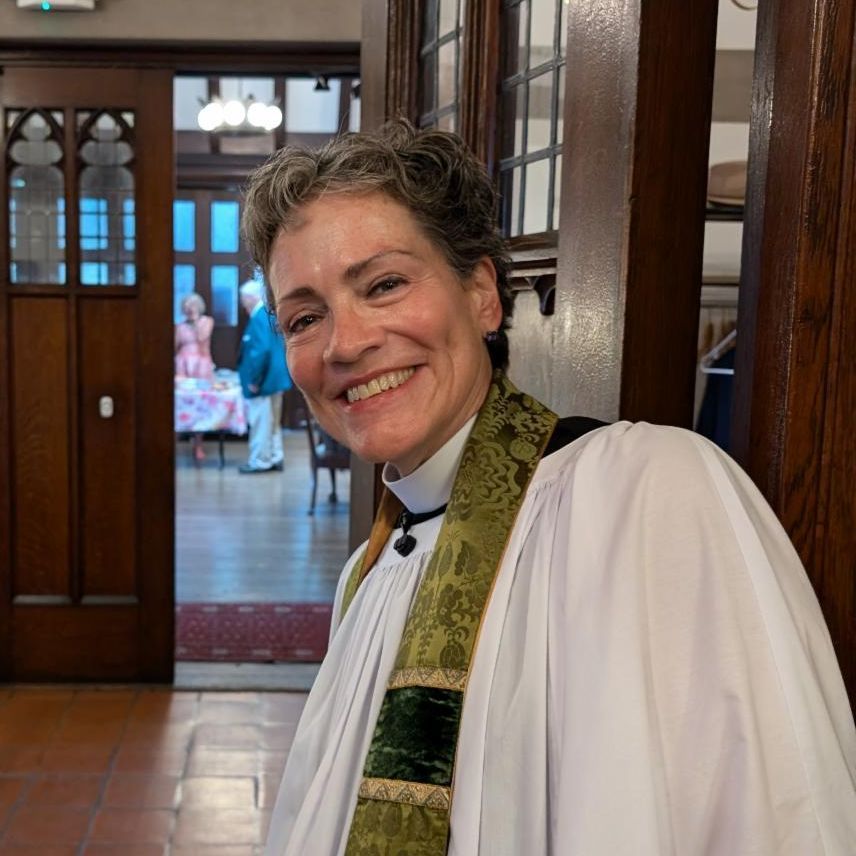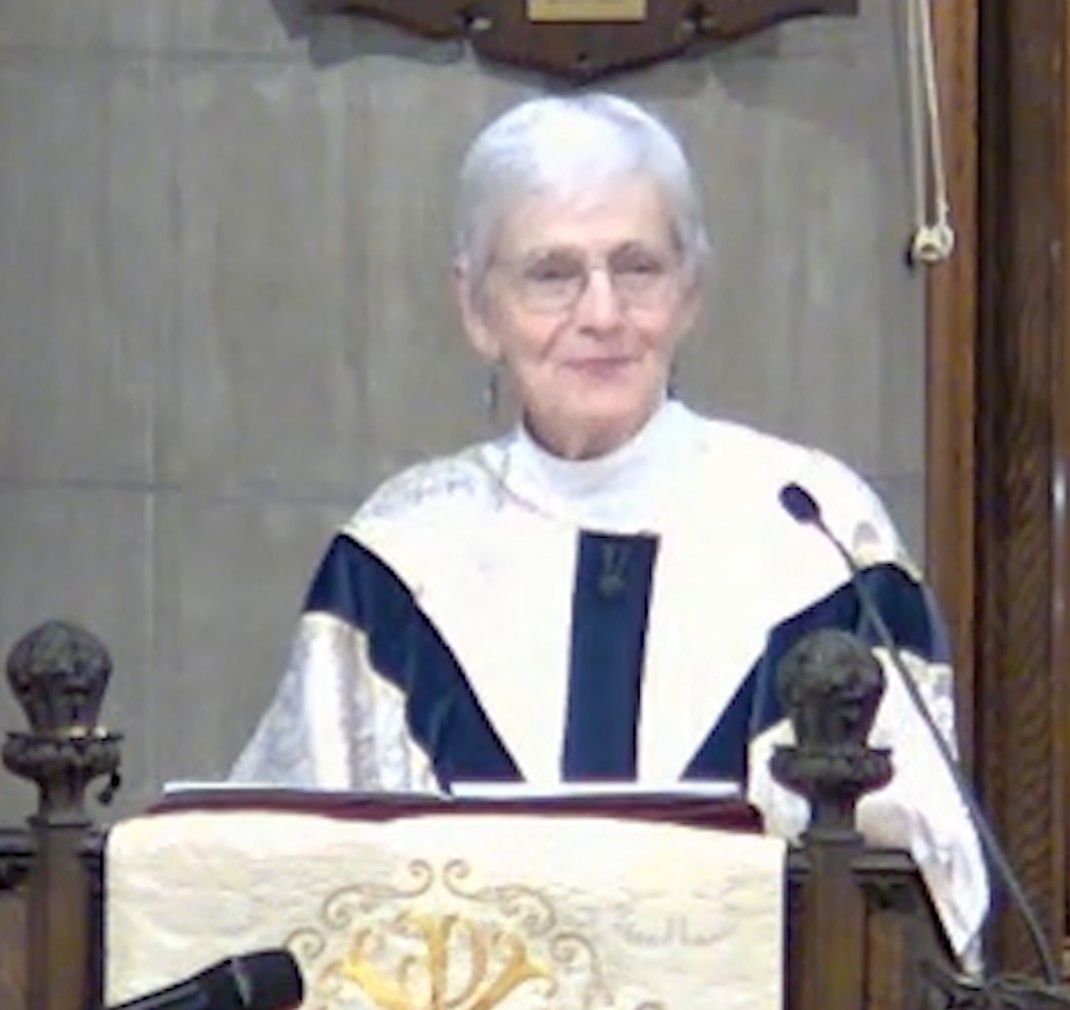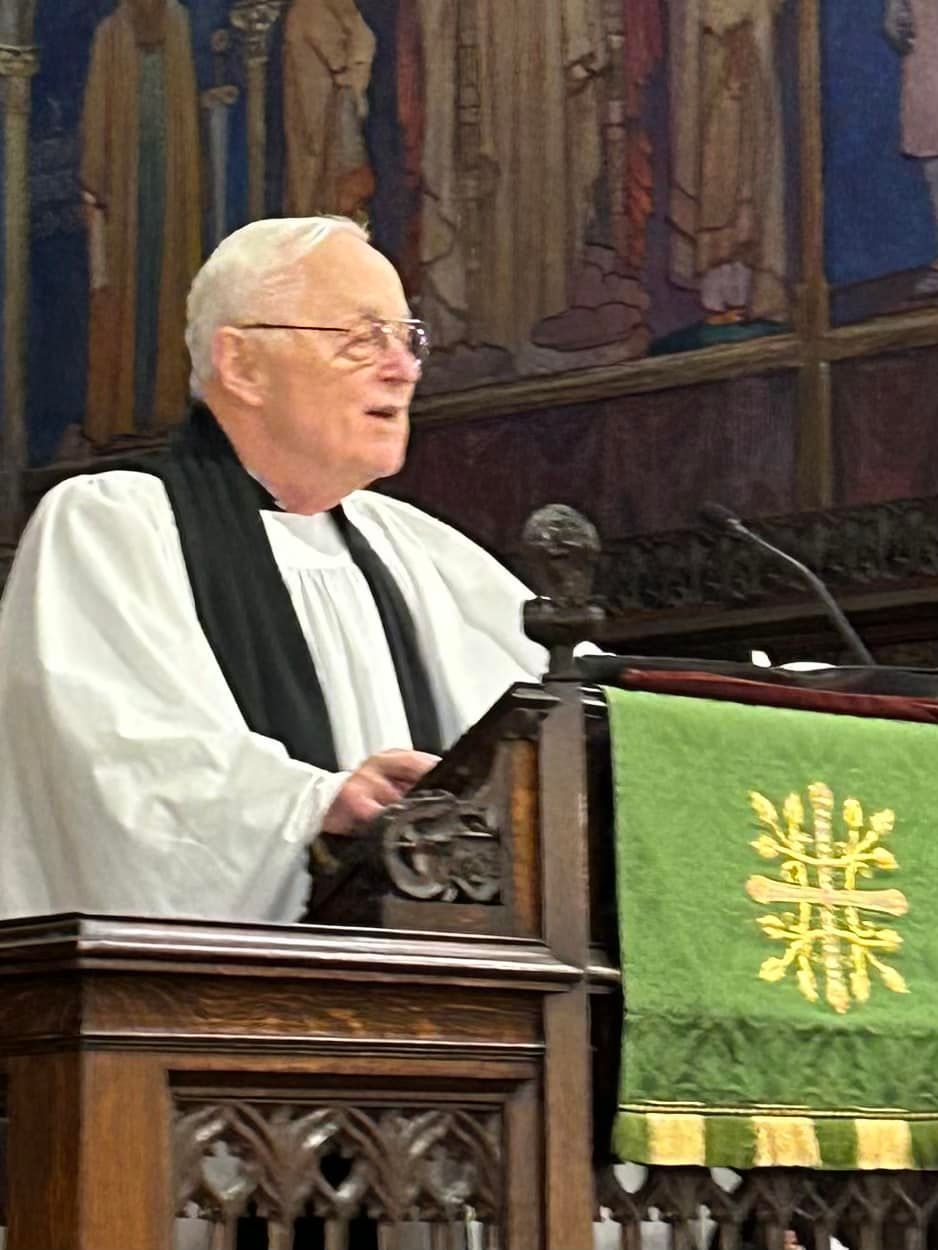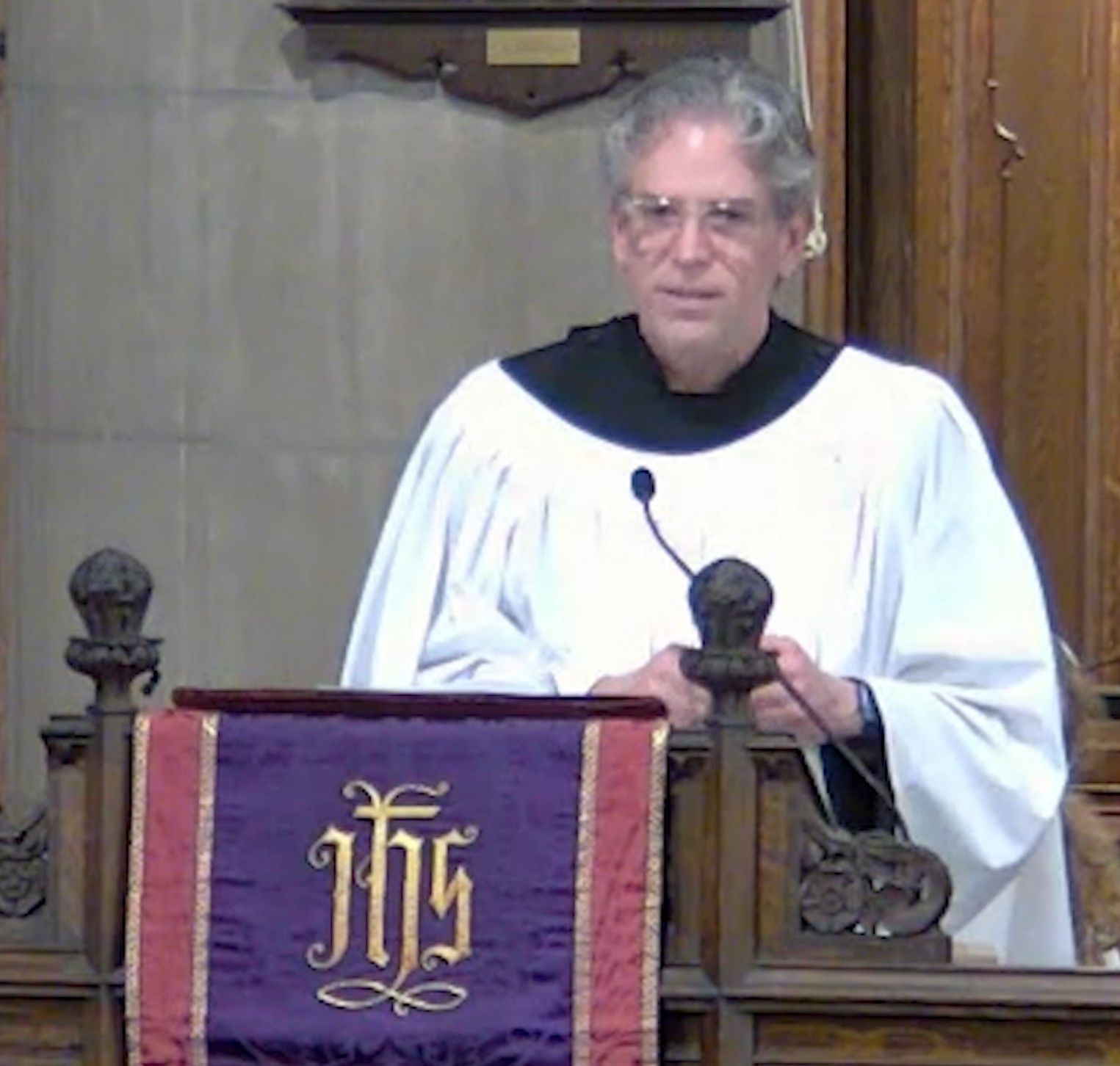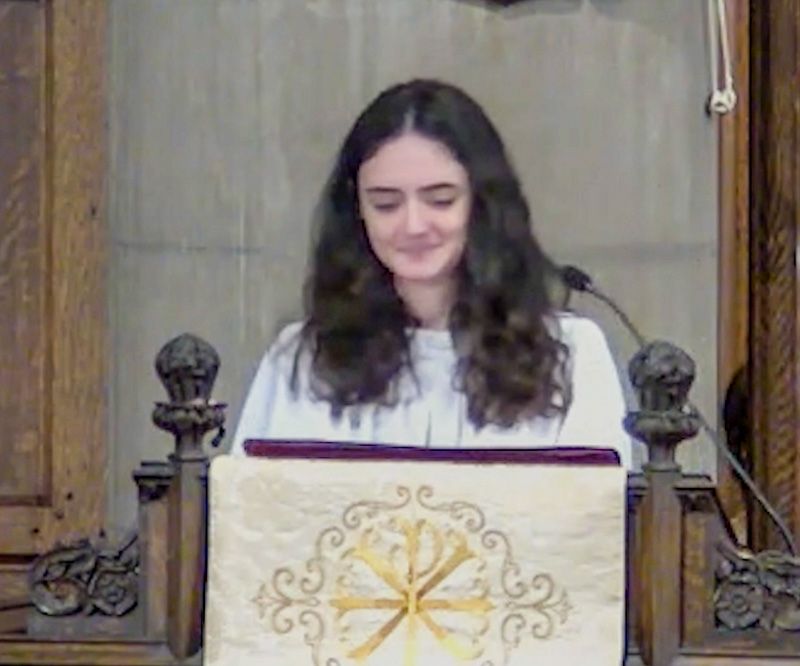The Advocate
The Feast of Pentecost
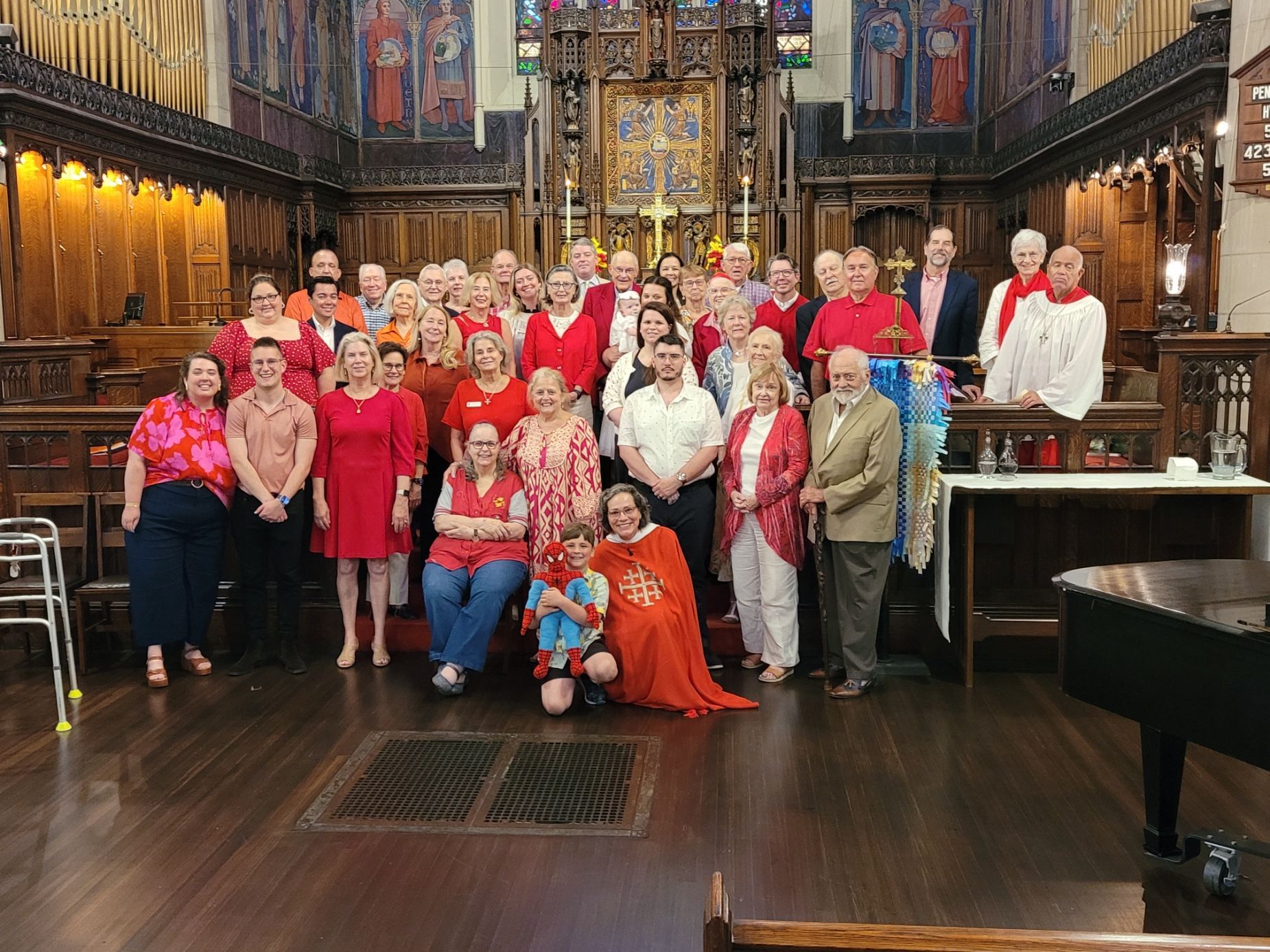
The Advocate
Today we celebrate Pentecost, translated from the Greek of the New Testament as the “fiftieth day” after Easter. So what is this feast of Pentecost, and how do we celebrate? We wear red on Pentecost, recalling the tongues of flame that rested on each of the disciples, filling them with the Holy Spirit. We remember the tongues of flame with the ribbons and the streamers — and the Holy Spirit with doves. Remember John the Baptist baptized with water, and prophesied that a greater baptizer was coming — Jesus — who would baptize with fire and the Holy Spirit. We’ll remember John’s water, and Jesus’ fire and the Holy Spirit today with two baptisms after the sermon.
Some call Pentecost the birthday of the Church, because it’s the day the Church remembers that the Holy Spirit gave the disciples the power to do God’s work in the world, so some churches have birthday cake on Pentecost. (speaking of which, wait till you see what Debbie Venancio has made for Coffee Hour!) Pentecost is the start of Ordinary Time — that long stretch of days after Pentecost running through to the last Saturday before Advent. That’s our longest liturgical season, roughly 140 days to Lent’s 40 and Easter’s 50 days. We need every one of those 140 days, because Pentecost is the season for the Church — that’s all of us, powered up with the Holy Spirit, to get out there and do Jesus’ work in the world.
Today we read the great story from the Acts of the Apostles in multiple languages, helping us to imagine the miracle of inclusion in God’s message, no matter who we are, what language we speak, or where we’re from. Reading the story in French, German, Italian, and Swahili helps us to remember the barriers to understanding others, and how hard we need to work when we meet difference of any kind to stay curious, and ready to learn something new or change our minds. Language is also a great metaphor for all kinds of difference — national, cultural, religious, ethnic, geographic, racial, and even gender differences. (Remember John Gray’s 1992 essay, Men are from Mars, Women are from Venus.) God brings people together through language in the Pentecost story, not by eliminating difference but by bringing people together through the Holy Spirit. People of the widest array of origins and backgrounds that the writer of Acts could even imagine each understood the story of God’s deeds of power in their own language.
So we don’t miss that point, Acts lists these exotic linguistic backgrounds — Parthians, Medes, Elamites, and residents of Mesopotamia, Judea and Cappadocia, Pontus and Asia, Phrygia and Pamphylia, Egypt and the parts of Libya belonging to Cyrene, and visitors from Rome, both Jews and proselytes, Cretans and Arabs, again reminding us that the disciples were relative locals, from small fishing villages around the Sea of Galilee. Just to be sure we don’t roll our eyes and dismiss or explain away the miracle, the Acts reading plays out the whole drunk or crazy objection right in the text. When some in the crowd scoff, making fun of the disciples and saying They have had too much wine, Peter stands up with the disciples and speaks to the crowd: Fellow Jews and all of you who live in Jerusalem, let me explain this to you; listen carefully to what I say. These people are not drunk, as you suppose. It’s only nine in the morning!
Berkeley at Yale Dean Andrew McGowan wrote in his blog this week that we must not fall into a saggy doctrine of the spirit with generic or unconsidered ideas about inclusion, or a simplistic reflection about religious experience or feelings. (Those of you who heard Dean McGowan preach here at Emmanuel in May can surely hear what he calls his “thick, Connecticut accent” — he’s Australian — in his wry humor and rigorous scholarship.) There’s way more at stake here. If the Spirit is intimately present for the faithful, and remakes and renews us, she (and she/hers are Holy Spirit’s preferred pronouns) claims our attention and praise in moments of joy AND struggle, and calls on us to be, and DO, God’s activity in the world — Jesus’ own hands and feet on earth, as St. Theresa would say. John’s gospel this morning specifically holds us to account on this. John’s Jesus promises that God will send the Advocate, the Holy Spirit, to teach you everything, and remind you of all that I have said to you.
While Dean McGowan points out that the translation of the original Greek word Paraclete in John’s gospel is problematic in many languages, I actually really like the word Advocate for the Holy Spirit in this context. She’s a kind of mighty Superlawyer, with an encyclopedic knowledge of the law, a shero’s cape, and a passion for justice. I used to like to respond to my male law partners’ good-natured and mostly benign lawyer games of one-upmanship with the assertion that the foundation of advocacy is the heart of a mother. Think of the fierce, relentless love of a mama bear protecting her cubs, or the “hysterical strength” of a human mother lifting a car to save her trapped child underneath. You can easily imagine that this riposte got under the guys’ skin a little — particularly for my litigation partners, who were pretty sure transactional lawyers like me weren’t real lawyers anyway. In my defense, my assertion of the power of feminine advocacy was always a checkmate to my male partners’ challenge, and never an offensive move.
Is the image of a mother as the Advocate a little sexist? Sure, and we also have many strong male images of God to help us imagine in our own experience and language God’s strength and power. It’s important to remember, as the bumper sticker famously says, that God is not a boy name. Imposing a gender on God makes God smaller and more like us, and God’s awesome power resists such limitations even as we use our own human experience and language to try to describe, understand, and turn toward God’s awesome power. While my response to my partners was lighthearted, a mother’s love as the image of God’s activity in the world gets to right to the intensity of the presence of the Paraclete, which, in its most literal sense means someone called to another’s side. This someone is typically a legal representative, which is where our translation Advocate comes from. The Advocate is simply the presence of Jesus in the Church, at all times and in all ways, in struggle as well as in joy. It is when we are most like Jesus that the Spirit is most clearly active — not in our feelings alone, but in our actions, keeping Jesus’ commandments to act in love of him and of each other. Our challenge is to be, and do, God’s activity in the world.
How do we DO JESUS — that is, live out the gospel at Emmanuel, sharing the amazing power of God’s love with the wider community in languages that everyone understands, especially if Episcopalian is not their native language? Let’s speak of joy in the language of music. Let’s tell the story of hospitality by offering space in the Community Garden to the whole community — parishioners, Newport Classical staff and volunteers, neighbors, and community collaborators. Let’s speak a language of shared concern for our environment and future together with our native pollinator garden. And let’s tell God’s story of belonging with the Community Bridge, welcoming everyone in the same door to life at Emmanuel. Let our architecture express God’s gift of radical inclusion through the very design of Emmanuel’s entrance as the Advocate guides and empowers us along God’s way. In the words of the Te Deum, one of our most beloved canticles from Morning Prayer,
The glorious company of apostles praise you.
The noble fellowship of prophets praise you.
The white-robed army of martyrs praise you.
Throughout the world the holy Church acclaims you;
God, of majesty unbounded,
your true and only Son, worthy of all worship,
and the Holy Spirit, advocate and guide. Amen
